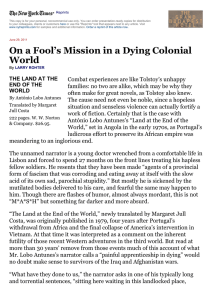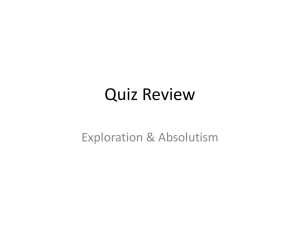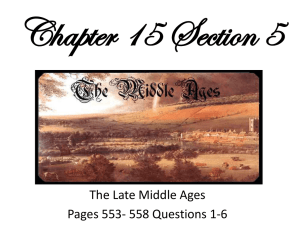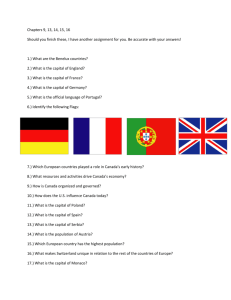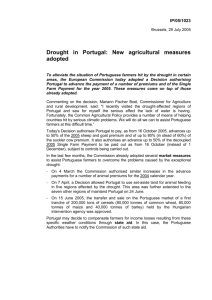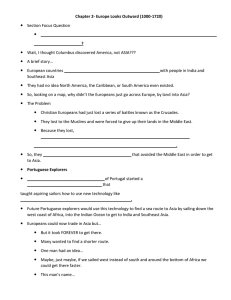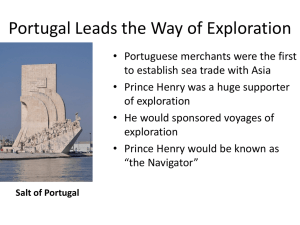Antonio Lobo Antunes on ‘The Land at the End of...
advertisement
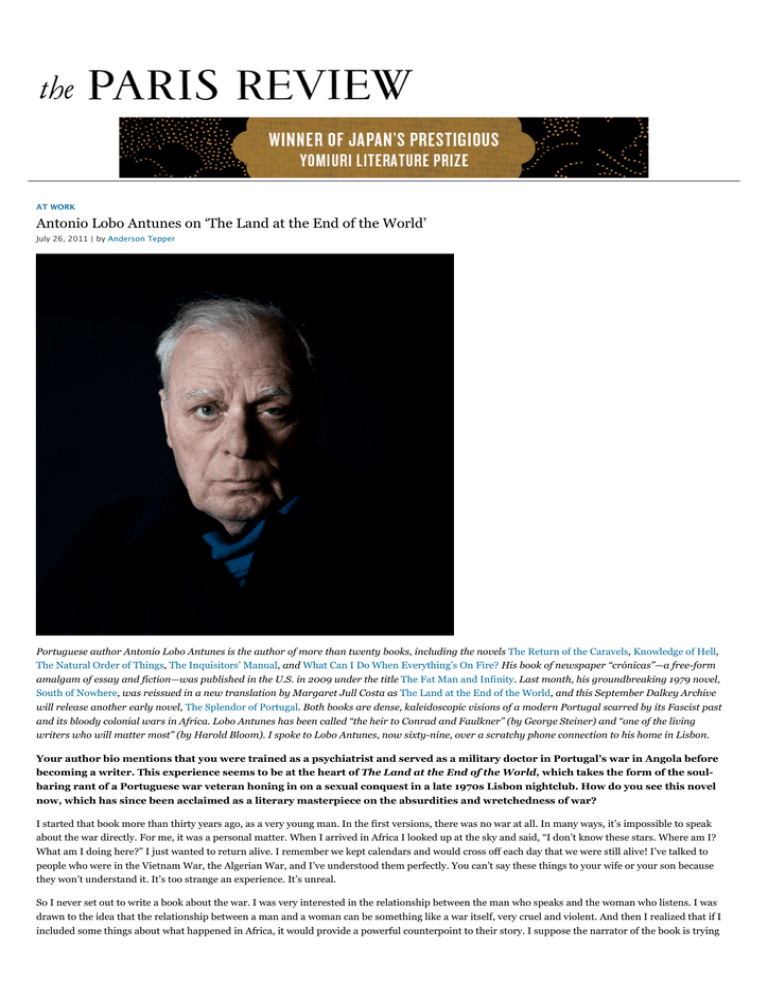
AT WORK Antonio Lobo Antunes on ‘The Land at the End of the World’ July 26, 2011 | by Anderson Tepper Portuguese author Antonio Lobo Antunes is the author of more than twenty books, including the novels The Return of the Caravels, Knowledge of Hell, The Natural Order of Things, The Inquisitors’ Manual, and What Can I Do When Everything’s On Fire? His book of newspaper “crónicas”—a free-form amalgam of essay and fiction—was published in the U.S. in 2009 under the title The Fat Man and Infinity. Last month, his groundbreaking 1979 novel, South of Nowhere, was reissued in a new translation by Margaret Jull Costa as The Land at the End of the World, and this September Dalkey Archive will release another early novel, The Splendor of Portugal. Both books are dense, kaleidoscopic visions of a modern Portugal scarred by its Fascist past and its bloody colonial wars in Africa. Lobo Antunes has been called “the heir to Conrad and Faulkner” (by George Steiner) and “one of the living writers who will matter most” (by Harold Bloom). I spoke to Lobo Antunes, now sixty-nine, over a scratchy phone connection to his home in Lisbon. Your author bio mentions that you were trained as a psychiatrist and served as a military doctor in Portugal’s war in Angola before becoming a writer. This experience seems to be at the heart of The Land at the End of the World, which takes the form of the soulbaring rant of a Portuguese war veteran honing in on a sexual conquest in a late 1970s Lisbon nightclub. How do you see this novel now, which has since been acclaimed as a literary masterpiece on the absurdities and wretchedness of war? I started that book more than thirty years ago, as a very young man. In the first versions, there was no war at all. In many ways, it’s impossible to speak about the war directly. For me, it was a personal matter. When I arrived in Africa I looked up at the sky and said, “I don’t know these stars. Where am I? What am I doing here?” I just wanted to return alive. I remember we kept calendars and would cross off each day that we were still alive! I’ve talked to people who were in the Vietnam War, the Algerian War, and I’ve understood them perfectly. You can’t say these things to your wife or your son because they won’t understand it. It’s too strange an experience. It’s unreal. So I never set out to write a book about the war. I was very interested in the relationship between the man who speaks and the woman who listens. I was drawn to the idea that the relationship between a man and a woman can be something like a war itself, very cruel and violent. And then I realized that if I included some things about what happened in Africa, it would provide a powerful counterpoint to their story. I suppose the narrator of the book is trying to use the tales of war to seduce the woman—he believes that women are weak when it comes to these things. I was surprised by the solitude of this character, this lonely and miserable man. The book is about a very personal vision of hell. Were there other Portuguese artists and writers addressing the legacy of the country’s colonial wars [which lasted from 1961 to 1974 in Angola, Mozambique, and Guinea-Bissau], or was it a forbidden or ignored subject? Nobody dared to speak about it because censorship was very strong. Before democracy, many, many authors went to jail and their books couldn’t be published. They’d write about antiquity, invented countries, or other subjects to avoid censorship. My book was the first to talk about the things that had actually happened. It came out in 1979, five years after the Revolution of 1974 that overthrew the Fascist dictatorship that had ruled Portugal for four decades. And it sold incredibly well because people wanted to know what was going on. Newspapers, books, and movies had all been controlled up until then, if not completely forbidden. Growing up, it was normal not to have a passport, not to talk about politics, not to use the word democracy. I remember once asking my father as a boy, “What is democracy?” And he answered, “Shut up and eat.” After the revolution, there was a kind of unspeakable culpability in Portugal. As happened in many other countries, the members of the military police, who were very cruel and violent, were in jail for just a short time and then were back out, working for the intelligence services. It was like that in Germany after the war and in Romania. Two or three years after the revolution, everyone just wanted to forget, to believe that more than forty years of dictatorship had never happened, that the wars hadn’t happened. But for me they had, because one of my cousins had been killed, my brother was jailed, and I had been in Angola. In The Land at the End of the World the narrator rages, “I hated the people who were lying to us and oppressing us and humiliating and killing us in Angola, the serious, dignified gentlemen in Lisbon stabbing those of us in Angola in the back.” That’s pretty damning language. What I really objected to was the fact that they sent us to war in the name of abstractions—motherland, honor, courage, and so on. And the politicians didn’t give a damn about us. It was clear that there were economic interests behind the war, that people were becoming rich selling arms to both sides of the conflict. That’s what I saw—some people became rich while the soldiers were usually very poor and came from poor families. But people just didn’t know what was happening. When Bush started the war in Iraq, for example, my eldest daughter was there because she belonged to an international medical association. But she saw very little because the American army moved all those organizations to the border. That book’s narrator, while wasting away in Africa, also dreads coming home to Portugal, writing, “The fear of returning to my country makes my throat tighten because, you see, I have no place anywhere, I went too far away for too long ever to belong here again, to these autumns of rain and Sunday masses, these long winters as dull as blown lightbulbs, these faces I can barely recognize beneath all the lines and wrinkles, clearly invented by some ironic caricaturist.” When he finally does return, it’s as if he sees his city —and his family—in a completely different way. Yes, the most horrible thing was coming back, returning to Lisbon, because we didn’t know how to live anymore. We didn’t know how to pay for gas, for water, and so on. When you’re in the army, they take care of everything—they feed you, they dress you. Returning, you feel like someone who has had a stroke and must learn how to speak again, how to do everything again. That was very difficult for me—very difficult for all of us—because we were all very young, just in our twenties. When I think about that book—and I try not to think about it much actually—I like the idea of having written it. But it’s not what I want to write now. And I’ve never returned to Angola. They’ve invited me to come visit, but I’ve always refused. Surprisingly, the relationship between our two countries is very good now and the Angolans have shown an amazing capacity for forgiveness and generosity. We Europeans destroyed so much. We destroyed entire civilizations. They had a very rich literature, a very rich history of medicine. And yet we destroyed everything, bit by bit, in the name of civilization, in the name of culture. Do the psychic wounds from these conflicts persist in Portugal’s collective memory? I don’t know. All I know is that I have an annual lunch with a group of friends who are veterans of the wars, and during the week afterward it’s very hard for me to sleep. So it’s still inside if all of us, and it will remain inside me until I die. You’ve become world-renowned, a national treasure in Portugal. You were given the Jerusalem Prize for the Freedom of the Individual in Society in 2005 and the Camões Prize, the most important literary prize for the Portuguese language, in 2007. How does it feel to be so celebrated? It’s all very surprising. But these prizes have nothing to do with literature. As a writer, you just have to shut your door and write. It’s funny—my wife is more jealous of my books than of other women because I’m always working and thinking about my books. I suppose I have become a sort of living monument in Portugal. But I come from a family with roots all over the world, so the idea of patriotism is not very strong in me. My country is the country of Chekhov, Beethoven, Velasquez—writers I like, painters and artists I admire. Like 27 35 3 72 TAGS Angola, Antonio Lobo Antunes, censorship, democracy, Fascism, Jerusalem Prize, Margaret Jull Costa, Nobel, Portugal, The Fat Man and Infinity, The Land at the End of the World, The Splendor of Portugal, war You might also enjoy Lello Bookstore, Letter from Letter from Mario Vargas High-Altitude Porto, Portugal Portugal: To a Portuguese Nun Portugal: Sonnets from the Portuguese Llosa: A Portrait in Miniature Language, and Other News 3 Comments Jayanta Bora | July 26, 2011 at 12:34 pm Antonio Lobo Antunes’ interview is very impressive and the last line he spoke. Zorg Freisch | August 3, 2011 at 2:50 am “My country is the country of Chekhov, Beethoven, Velasquez—writers I like, painters and artists I admire.” –If this man was everyone’s dad, the world would be a better place. Ashley Bishoff | March 20, 2012 at 1:17 am Can I simply say what a relief to find somebody who truly is aware of what theyre talking about on the internet. You definitely know the right way to deliver an issue to mild and make it important. Extra people have to learn this and understand this side of the story. I cant imagine youre not more widespread because you definitely have the gift. 7 Pingbacks Antonio Lobo Antunes on ‘The Land at the End of the World’ | ART says: July 26, 2011 at 12:03 pm [...] When Everything’s On Fire? His book of newspaper “crónicas”—a free-formed amalgam… Read More Posted in Art Tags: paris « how to Draw Green Yoshi DUNGEON SIEGE 3 Trailer [Updated [...] Personal vision of hell. | Who Killed Lemmy Caution? says: July 27, 2011 at 12:41 am [...] [via The Paris Review] [...] Antonio Lobo Antunes – interview « JJ Pollet says: July 27, 2011 at 5:47 am [...] Interview met de Portugese auteur te lezen op het blog van The Paris Review. [...] Antonio Lobo Antunes Interview | Conversational Reading says: July 28, 2011 at 10:51 am [...] Lobo Antunes Interview Discussing his newest book in English: Your author bio mentions that you were trained as a psychiatrist and served as a military doctor [...] Men Can & Much More | Red Weather Review says: July 28, 2011 at 1:32 pm [...] Here‘s an interview with the Portuguese author Antonio Lobo Antunes, whose early novels The Land at the End of the World and The Splendor of Portugal are out in reissues. [...] Assorted links — Marginal Revolution says: July 29, 2011 at 1:30 pm [...] 1. Interview with Lobo Antunes. [...] Translating Angola – Africa is a Country says: December 5, 2011 at 12:01 pm [...] up brutal scenes of European colonialism as the best examples of literature from and about Africa, George Steiner’s praise for Antunes as Conrad’s rightful heir becomes a bit of a backhand [...]
